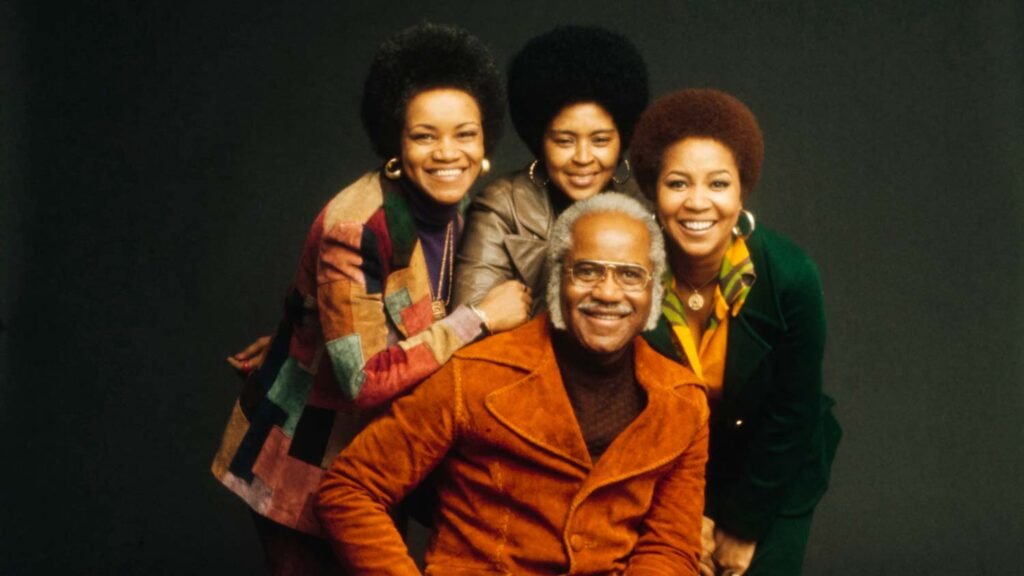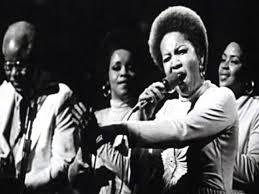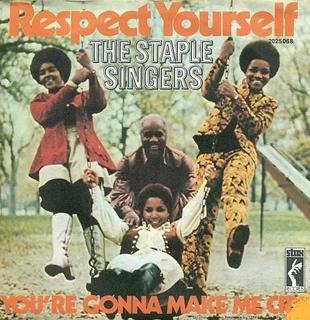
Pocas obras encapsulan el cruce entre el soul, el gospel y la lucha social como Be Altitude: Respect Yourself. Lanzado en 1972 por Stax Records, este disco llegó en un momento clave para la comunidad negra en EE.UU. La lucha por los derechos civiles había cambiado de fase: Martin Luther King ya no estaba, el movimiento Black Power cobraba fuerza y la música soul se había convertido en la banda sonora de la resistencia, la dignidad y el orgullo. The Staple Singers, con su mezcla única de espiritualidad y compromiso social, dieron un paso más con este álbum, combinando la profundidad del gospel con un groove callejero y directo. No era solo música, era un mensaje claro: el respeto comienza por uno mismo y el cambio es posible si se camina con la cabeza en alto.

Be Altitude: Respect Yourself se grabó en 1971 en los estudios Muscle Shoals Sound de Alabama, cuna de algunos de los mayores clásicos del soul. Detrás de la producción estuvo Al Bell, una figura clave en Stax Records, que supo encontrar el equilibrio perfecto entre la esencia del grupo y una instrumentación impecable. Acompañándolos, la legendaria Muscle Shoals Rhythm Section—músicos blancos del sur de EE.UU. que, con un respeto absoluto por el soul, ayudaron a crear una base rítmica vibrante y orgánica. La combinación de la voz poderosa de Mavis Staples, la guitarra gospel de Pops Staples y una sección rítmica sólida dio como resultado un álbum que transmitía fuerza, espiritualidad y un llamado a la acción.

1. “Respect Yourself” – Un himno, un manifiesto, un mensaje de empoderamiento. Escrita por Luther Ingram y Mack Rice, esta canción es un recordatorio de que el respeto propio es el primer paso para el cambio. La batería de Al Jackson Jr. y el bajo de David Hood crean un groove relajado pero imponente, mientras Mavis canta con la autoridad de quien está predicando una verdad absoluta. Y cuando la guitarra de Pops entra con su inconfundible estilo bluesero, todo cobra aún más sentido: esto no es solo música, es filosofía de vida.
2. “I’ll Take You There” – Pura trascendencia musical. Desde el primer segundo, con ese bajo tan distintivo de David Hood, sabes que estás ante algo especial. La estructura de llamada y respuesta hace que la canción se sienta como un ritual colectivo, con Mavis guiando la energía. Los músicos de Muscle Shoals lo entendieron bien: menos es más, dejando que las voces sean las protagonistas. No es casualidad que llegara al número uno en las listas; este tema no solo es una canción, es una visión de esperanza, un espacio sonoro donde todo es posible.
3. “This World” – Si “I’ll Take You There” te invita a un lugar mejor, “This World” es el recordatorio de las luchas que quedan por afrontar. Con un ritmo más cercano al gospel clásico, la guitarra de Pops Staples resuena con un eco profundo y conmovedor. La letra reflexiona sobre la injusticia y la perseverancia, y la forma en que las voces se entrelazan con la base rítmica hipnótica hace que la canción sea una de las más emotivas del álbum.
4. “We the People” – Here’s where the album’s political core really shines. Over a raw, percussive groove, the Staples deliver a message of unity and collective strength. There’s an urgency in Mavis’ voice, a fire that refuses to be ignored. The song’s stripped-down arrangement lets the lyrics take center stage, reinforcing the theme that power lies in the hands of the people. It’s a song that could have easily fit into the soundtrack of the Black Power movement, standing shoulder to shoulder with the era’s greatest protest anthems.

5. “Who Do You Think You Are (Jesus Christ the Superstar)?” – Un tema poco mencionado pero lleno de actitud. Con un bajo contundente y una sección de metales que resalta cada frase como si fueran signos de exclamación, esta canción es una joya escondida del disco. El juego de voces entre los integrantes del grupo le da un aire de improvisación, como si estuvieras en medio de un ensayo lleno de energía. Es un recordatorio de la versatilidad del álbum, donde el mensaje y el groove siempre van de la mano.

El álbum generó dos grandes éxitos: “Respect Yourself” y “I’ll Take You There”. Ambos trascendieron las listas y se convirtieron en parte fundamental de la cultura negra. “Respect Yourself” alcanzó el #2 en las listas de R&B y se convirtió en un himno de empoderamiento, mientras que “I’ll Take You There” llegó al #1 en el Hot 100 y en las listas de R&B, consolidando a The Staple Singers como una de las agrupaciones más influyentes del soul. Estas canciones no fueron solo éxitos comerciales; se convirtieron en afirmaciones de identidad, en testimonios del poder de la música para elevar y transformar.

Uno de los mayores logros de Be Altitude es la forma en que logra alinear su mensaje con su sonido. Aquí, el bajo no es solo una línea melódica, es la base de un sermón. La batería no solo marca el ritmo, sino que es el latido de una revolución. Cada tema tiene un propósito claro, desde la repetición casi hipnótica de “I’ll Take You There” hasta la energía contagiosa de “Respect Yourself”. Nada sobra, cada detalle cuenta. Es un álbum que demuestra que la música no solo se escucha, se siente.

Algunos discos entretienen, otros inspiran, pero pocos logran lo que Be Altitude: Respect Yourself consiguió: ser una obra que marcó la historia. Este álbum es un testimonio de orgullo, resistencia y fe. Es soul con un propósito, música con mensaje, una invitación a caminar con la cabeza alta. Si nunca lo has escuchado, es hora de hacerlo. Y si ya lo conoces, vuelve a él y deja que te recuerde por qué The Staple Singers son y serán siempre una de las agrupaciones más importantes del soul.

Lista de Canciones
- 01 This World
- 02 Respect Yourself
- 03 Name The Missing Word
- 04 I’ll Take You There
- 05 This Old Town (People In This Town)
- 06 We The People
- 07 Are You Sure
- 08 Who Do You Think You Are? (Jesus Christ Superstar)
- 09 I’m Just Another Soldier
- 10 Who
